#Henry IV of England
Text
You want Henry V to live longer so that he could finish conquering France.
I want Henry V to live longer so that he could finally compose music for all parts of the Mass and not just the Gloria and the Sanctus.
We are not the same.
#henry v of england#henry iv of england#roy henry#old hall manuscript#we don't know whether roy henry is henry iv or v#but for this post let him be henry v#house of lancaster#house of plantagenet#Spotify
32 notes
·
View notes
Text
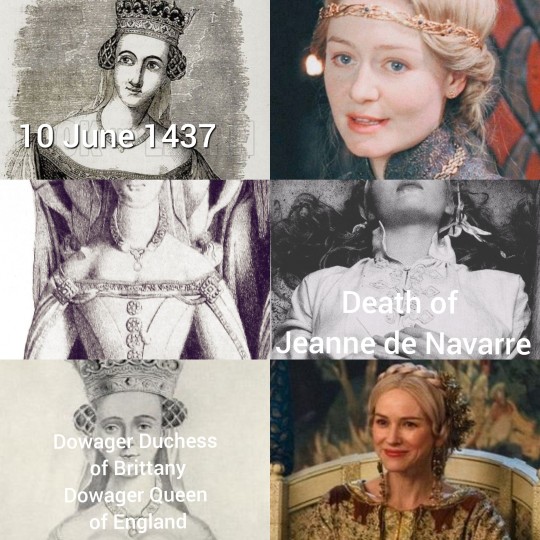
On this day in History, 10 June 1432, Jeanne d'Évreux, daughter of Navarre, died at Havering-atte-Bower. She was formerly Duchess of Brittany by her first marriage, and Queen of Enfland by her second marriage, which was a love union. Despite being imprisoned for some years by her stepson, Henry V, Joan (as she was better known by her English subjects) still received visits from her stepchildren such as Humphrey of Gloucester and John of Bedford, but more often her Beaufort in-laws like Cardinal Beaufort. She was buried next to Henry.
#house of lancaster#house of evreux#jeanne d'evreux#joan of navarre#henry iv of england#queen joan#dowager queen of england#dowager duchess of brittany#plantagenet dynasty
12 notes
·
View notes
Text
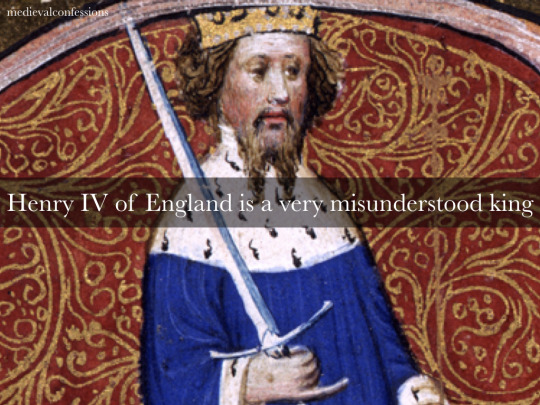
7 notes
·
View notes
Text
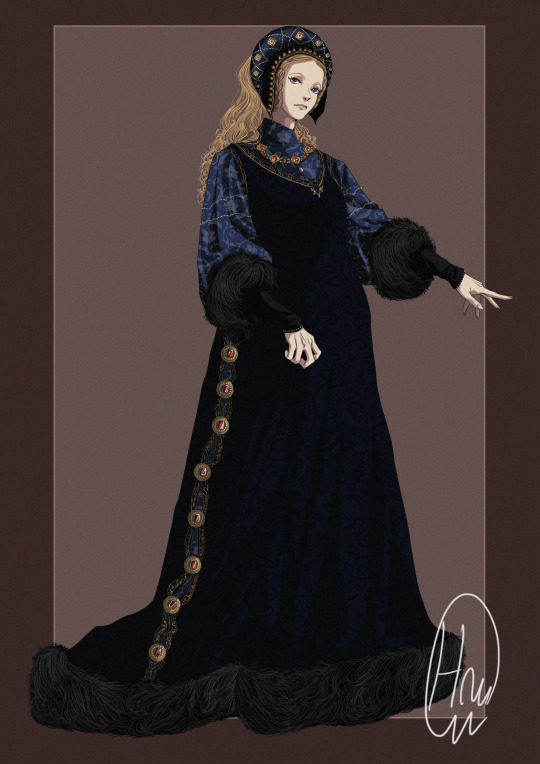
Elizabeth of York, fashion character design. Mourning outfit, c. 1482.
#the wars of the roses#15th century#medieval#middle ages#historical#british history#medieval england#art#illustration#sketch#edward iv#elizabeth woodville#elizabeth of york#henry vii#henry vi#margaret of anjou#margaret beaufort#isabel neville#richard iii#the white queen#the white princess#medieval fashion#historical fashion#character design#artists on tumblr#medieval costume#royals#house of york#plantagenets
311 notes
·
View notes
Text
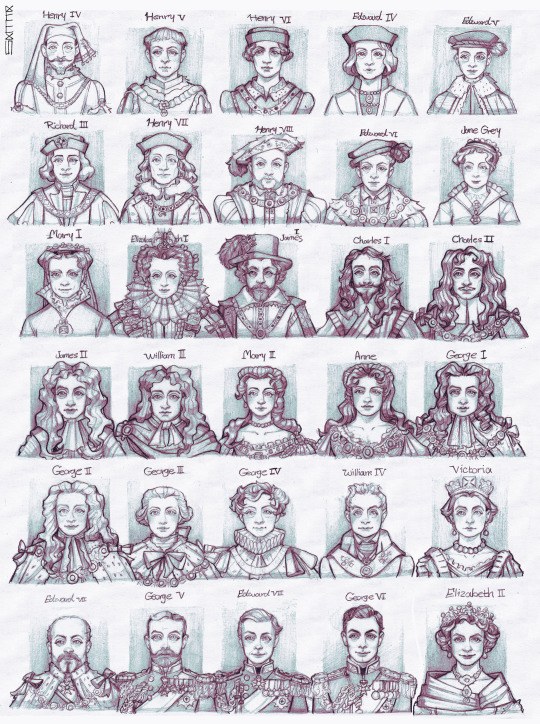
Something I had done years ago on A4 size paper. I think I skipped a few due to lack of space. Kings and Queens of England (after king Henry IV)
#kings of england#artists on tumblr#drawing#traditional art#traditional drawing#Richard III#Henry VII#Henry VIII#Mary I#Elizabeth I#Charles I#Charles II#George III#George IV#Queen Victoria#George v#George VI#Edward VII#queen elizabeth ii#history art
735 notes
·
View notes
Text
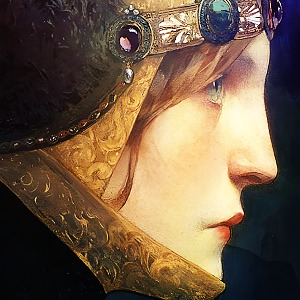

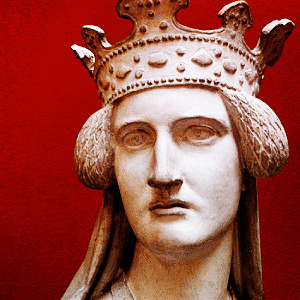
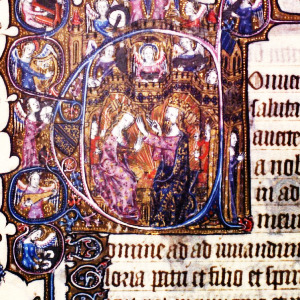


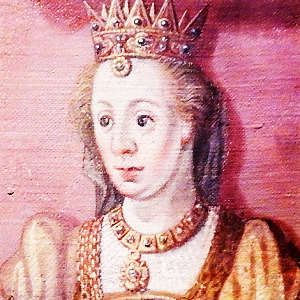
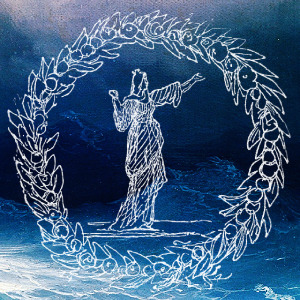
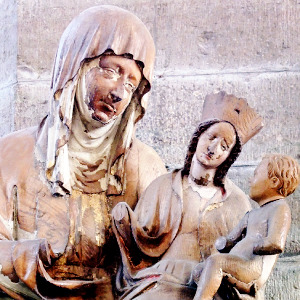
Philippa of England, Queen of Norway, Denmark and Sweden
Philippa of England was the youngest daughter and last child of Henry of Lancaster and Mary de Bohun, Earl and Countess of Derby, and was born on, or shortly before, 1 July 1394, when her mother died from complications in childbirth. Little is known of Philippa’s early childhood but when her father usurped the throne in 1399, becoming Henry IV, her future changed dramatically. No longer the youngest daughter of an earl, she was now a princess.
The new king almost immediately began searching for marriage alliances for his two daughters. 1401 saw Henry enter into marriage negotiations with Margrete of Denmark for Philippa to marry Margrete’s adoptive son and heir, Erik of Pomerania. Like Henry, Margrete was hoping for an alliance to strengthen her domestic position and that of the fledgling Kalmar Union of Norway, Denmark and Sweden. It wasn’t until 1405 that the marriage was formally agreed upon and in December, Philippa was proclaimed Queen of Norway, Denmark and Sweden. In August 1406, the 12-year-old Philippa sailed from England in August 1406. She married Erik at the cathedral of Lund, and her coronation soon followed. Famously, Philippa is the first documented European princess to wear white at her wedding.
She spent the next three years at Kalmar Castle in Sweden, the first year under the guidance of Katarina Knutsdotter (the granddaughter of Saint Birgitta of Sweden), and probably owing in no small part to her youth, Philippa remained in the sidelines of rule until Margrete’s death in 1412. She retained close ties to Sweden, serving as Erik’s de facto regent there, and was the only queen of the Kalmar Union to ever achieve popularity in Sweden. Of particular note is her patronage of Vadstenna Abbey, the motherhouse of the Bridgettine Order. She often stayed there when in Sweden, was a generous patron, and petitioned the pope multiple times on the Order's behalf, even enlisting the support of her brother, Henry V of England. In 1425, Philippa donated a choir dedicated to St. Anne, where she was later buried. This may have had particular significance for Philippa, as she had no surviving children..
Philippa was deeply involved in the rule of all three kingdoms of the Kalmar Union. In 1420, demonstrating Erik’s trust in her, it was decided that she would serve as regent to his heir, Bogislaw of Pomerania, should the marriage remain childless, and her widow’s pension would effectively give her a ‘queendom’ in Sweden. In 1423, Erik went on pilgrimage and Philippa served as his regent, with all power that entailed, until his return in 1425. She also obtained the resources and support Erik needed for his war against the Hanseatic League. Indeed, it was Philippa who organised the defence of Copenhagen against the bombardment of the Hanseatic League in 1428 to great acclaim.
In late 1429, Philippa, apparently in good health, travelled to Sweden to secure further support for the war against the Hanseatic League. She was staying in Vadstena Abbey when she fell seriously ill and died on the night of 5 and 6 January 1430, possibly following a stillbirth. Philippa was remembered almost universally favourably, a reputation that was surely deserved.
Sources: Paris, Bibliothèque Nationale, MS Lat. 17294), "Filippa, drottning", Svenskt kvinnobiografiskt lexikon (article by Charlotte Cederbom), Steinar Imsen, “Late Medieval Scandinavian Queenship”. Queens and Queenship in Medieval Europe, Mary Anne Everett Green, Lives of the princesses of England from the Norman conquest, Vol 3.
#philippa of england#edits#on this day#historyedit#henry iv#henry v#medieval scandinavia#kalmar union
87 notes
·
View notes
Photo








↳ richard iii of england + alphabet
#richard iii#aneurin barnard#the white queen#house york#house plantagenet#history#english history#twq#richard iii of england#anne neville#cecily of york#edward iv#george plantagenet#elizabeth woodville#richard of york#henry vii#margaret of york#john de la pole#historyedit#twqedits*#alphabet*#my gifs#creations*
380 notes
·
View notes
Text
If you don't pick the obvious answer I will be forced to rage like Percy :(
#shakespeare#hollow crown#Henriad#tom hiddleston#Henry V#richard ii of england#henry iv#rb for sample size#booklr
44 notes
·
View notes
Note
What do you feel about the house of york
I feel like it's a medieval dynasty that one a war. That's about it.
I also think that Richard Duke of York was nothing more than a jealous cousin that saw the perfect opportunity to climb the ladder and took it, justly paying the price. Edward IV's anger over his and his brother's death is understandable and so were his actions. Too bad that he didn't saw that the Duke of York's ruthless ambitions had trickled down to his sons Richard and George before they tried it with him. I think the Woodvilles were overtly greedy and took too much of the hand that fed them making the nobility hate them, and they also paid for it. I mean, arranging prestige marriages for every single Woodville? I get it, one of them was the Queen, but come on now, they clearly overplayed.
On the whole, I find this representation of the Yorks as this typical Good HeirsTM that took their rightful place on the throne and stepped up through harsh times that persists so much to this day lame and reductive. The truth of the matter is, they were never more just and GoodTM than the Lancasters. The Lancasters successfully organized a coup and sat the throne, the Yorks did the same, demonizing Henry VI and Queen Margaret of Anjou through propaganda as a freak and an overly ambitious femme fatale respectively, while casting their teenage son as a cruel bastard. All for defending fiercely what was by right theirs (we have Shakespeare to blame for that as well).
#wars of the roses#house york#house lancaster#edward iv#richard duke of york#george plantagenet#richard iii#Henry vi#margaret of anjou#edward of westminster#medieval warfare#medieval england#late middle ages
27 notes
·
View notes
Text
Elizabeth of York being that iconic that every man who ever met her immediately fell in love with her, she was the darling of her father Edward IV’s eye, had her Uncle Richard III wrapped around her finger and then married her families enemy Henry VII in an arranged marriage but managed to get him to fall head over heals for her. To the point where he was on the short list of Kings in history who never took a mistress, remained loyal to her and is documented as being so depressed and suicidal after her death that he was never the same, and then her son who even though he became such a horrendous man he spent his entire life trying to replace his mother with every woman he met.
30 notes
·
View notes
Text
Henry IV's reign, marked by intrigue and conflict, stabilized England amid chaos, laying groundwork for future dynastic struggles and Tudor ascendancy. From rebellions to royal rivalries, his reign was a rollercoaster ride through some of England's most gripping chapters.
10 notes
·
View notes
Text
Started watching the Borgias and then I remembered speculations about Henry IV intending Humphrey to become a clergyman and now I am annoyed at the universe for not giving a timeline where Humphrey becomes the Pope. Humphrey's inherent Humphreyness and his active and disastrous love-life ( in comparison to the other Lancasterlings) would have made for a dramatic papacy.
#henry iv of england#henry bolingbroke#humphrey duke of gloucester#papacy#vatican#the borgias#the speculations are mostly due to the fact that humphrey was never assigned any military or administrative command by his dad#who instead preferred that he be educated#house of lancaster
5 notes
·
View notes
Text
“Whenever I am able to hear a good account of you, my heart rejoices exceedingly”
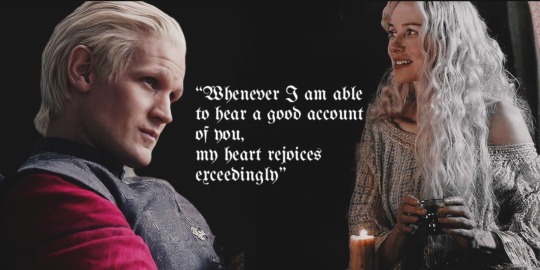
#house of lancaster#henry iv#plantagenet dynasty#henry iv of england#joan of navarre#king henry iv#king henry iv of england#queen joan#joanna of navarre#Matt Smith#Naomi Watts#Plantagenet edit#Lancaster edit#Henry IV x Joan Of Navarre
6 notes
·
View notes
Note
Hi! I don't know how much you're interested in the subject today, but considering how i really adored a lot of your opinions/views of the Wars of the Roses and some people involved, especially Richard III, i was wondering how you think a scenerio where Richard remained King for more time or simply won Bosworth would be
Thank you for the teresting question.
Contrary to historical fiction works that portray him as desperate at the Battle of Bosworth, I think it's more likely Richard was hoping to get rid of Henry Tudor quickly and saw him as just a temporary nuisance. If only the battle had happened a couple of days later, when Richard got reinforcements from the North, or if William Stanley had not made the decision to definitely switch sides to Henry, the battle would've probably gone completely differently.
Below is my speculation of what happens if Richard wins:
The immediate outcome seems relatively clear - we know now that Richard was in the middle of secret negotiations with the royal family of Portugal for a double marriage between him and Infanta Joanna, and Elizabeth of York and King's 16-year old cousin Manuel, Duke of Beja, which were apparently going very well. It seems unlikely that Joanna, who had been refusing to get married for so long, would accept, but supposedly the negotiations were going well. We know Richard had sent her a personal letter, so it's fun to speculate what he said that would make her reconsider. I'm thinking he may have talked about religion (as they were both known to be pious) and pitched the marriage in terms of a partnership, and how she could do good for peace and the people of England through charity work (which she was known to do) and maybe even assured her that she wouldn't have to keep having children after she gave birth to an heir? Richard was expected to remarry and have a son after his only legitimate son and his wife died, but going by his choice of bride, he was looking for a great Queen and political partner above all, and not a broodmare - I can't imagine Joanna, who wanted to be a nun and was against marriage, agreeing to keep popping up a child every year or two until she hits menopause. He also may not have been two concerned because he had an heir and spares already, even though not 'of his body'- - his adult nephew John de La Pole and his younger brothers William, Edmund and Richard. The Portugal double marriage would've been a genius political move for many reasons: it would allow Richard to claim that he was ending the York/Lancaster rift for good by marrying Joanna, since the Portuguese royal family were through the female line the main surviving Lancastrian branch; it would fulfil his promise to Elizabeth Woodville that he would find good matches for her daughters in spite of their new 'bastard' status - and how! a Portuguese royal marriage was worthy of a princess* - and could be seen as healing the rift between the Yorkists too (and would at the same time make it impossible for Henry Tudor or anyone else to try to claim the throne of England by marrying her); and it would give England a great, intelligent and respectable Queen, who had experience in ruling as regent and could rule in RIchard's absence when he spent time abroad in wars, and whose reputation for piety and charity for people would help restore his tarnished reputation.
One interesting consequence of his marriage alliance is that Elizabeth of York would eventually have become a Queen Consort, but of Portugal, as Manuel eventually became King.Manuel I in 1495.
Once the situation became more stable, Richard would've probably focused on the things he had already started to do during his short reign - legal reforms aimed mostly at bettering the judiciary and the status of common people, and he would no doubt also want to curtail the power of major noblemen of questionable loyalty such as the Stanleys - and things he is known to have enthusiastically talked about planning to do, such as trying to convince other European countries to mount a campaign to stop the Ottoman Empire's conquests in Europe. (France would be an unlikely ally, Portugal and Burgundy would be obvious ones, and he'd no doubt try to pitch it to the Holy Roman Empire.)
I don't know whether he'd be successful at that, or how long he would live, but a few most obvious historical consequences would be:
the way the previous few decades were remembered in history would be very different, and no one would ever call them the "Wars of the Roses" - which was a name given by Walter Scott in the 19th century based on the fact that Henry VII used the red-white Tudor rose as his sigil, promoting it as a sign of supposed unity between the Lancaster and York dynasties - in spite of the fact that the Lancasters didn't actually use a red rose, or any kind of rose, as their sigil. Henry VII also presented the conflicts that had gone on as a part of one ongoing conflict that he ended with the Battle of Bosworth and by marrying Elizabeth of York. In reality, these were a few conflicts separated by years or even decades in between, and before the battle of Bosworth, the last actual armed conflict fought over the throne of England had been 14 years earlier, when Edward IV won his second and decisive war over the Lancasters. The conflict between the two Yorkist factions after Edward's death did not result in any actual battle (in 1783, Buckingham failed to ignite a rebellion, and his ally Henry turned back to France, realizing the war was lost before it began), so Henry basically 'ended the Wars of the Roses' only after he restarted them in 1485. (Not to mention that Henry had to fight another battle two years later against the Yorkists led by Jon de la Pole, which is always conveniently left out in history books, and had to catch, exile or execute various Yorkist pretenders throughout his reign.) If Henry loses the battle, he becomes only a footnote in history. Edward IV remains considered the one who ended the Lancaster-York conflicts with his decisive victory in 1471. Richard probably manages to be popular and respected king (much more than Henry was with his notorious tax laws) and would likely have claimed to have 'united the York and Lancaster branches' with his marriage to Joanna (though he probably wouldn't have made a huge deal out of it as Henry did, since Henry was promoting himself as the founder of a new dynasty that would start a new era). But what of the Princes in the Tower? Well, we don't know what happened to them and Richard may be suspected to have murdered them, but Henry definitely did imprison 11 year old Edward of Warwick and keep him locked up in the Tower until he was 25 and then executed him on trumped up treason charges just because he was another pretender to the throne, but barely anyone talks about it or cares, so... (insert something about history being written by the winners)
Scotland and England remain separate independent countries. It's very unlikely that the same chain of events would happen where the daughter of a king of England marries a king of Scotland, and then a century later her descendant becomes not just the king of Scotland but also the heir to the throne of England because the ruling dynasty of England died out. There is never a Tudor dynasty, never a Stuart dynasty, never a Hanover dynasty. And there's never a United Kingdom.
There is never such a thing as Anglicanism/the Church of England, with the monarch as its head. Mind you, this doesn't necessarily mean that England remains fully or predominantly Catholic - Protestantism was gaining popularity not just in England (even when Henry was still a devout Catholic) but also in Scotland, which didn't have a Henry VIII splitting with the Pope so he could annul his marriage. It's impossible to tell how exactly the Reformation and Counter-reformation would've affected England under different monarchs and a different dynasty, since so much of the religious strife in the 16th century was linked to Henry's decisions, his break from the Pope, his marriages and annulments and his succession issues, and then with the personalities and backgrounds of his children: Edward as a staunch Protestant (just like his mother's family), Mary as a staunch Catholic (completely unsurprising with her background and the fact that her father broke from the Pope so he could annul his marriage to her mother, proclaiming her a bastard), and then Elizabeth, who couldn't be tolerant to Catholics even if she didn't care about religion, since the Pope and therefore all Catholics considered her a bastard and an illegitimate monarch. How would elderly Richard, and/or his heirs, treat Protestants? What would they think of Martin Luther, or of William Tyndale? It's impossible to tell. He was a devout Catholic, but Protestantism didn't exist at the time, and would he (who was the first of English kings to publish official state documents in English) hate the idea of translating the Bible into English so ordinary people could understand it without the help of clergy? I really don't know, and it's even harder to tell what his heirs would be like in that regard. Would there be more religious tolerance in England? For all we know, it might even be less if a particularly fanatical monarch ended up on a throne... but at least I think I can say with some certainty that English monarchs of this hypothetical York dynasty would have no personal and dynastic reasons to persecute either Protestants or Catholics the way monarchs of the Tudor dynasty had due to their specific circumstances.
#richard iii#english history#henry vii#the wars of the roses#battle of bosworth#the tudor dynasty#edward iv#elizabeth of york#henry viii#church of england#english reformation#wars of the roses
10 notes
·
View notes
Text

Elizabeth of York, fashion character design c. 1473-1474.
If you dare to think that I have developed some kind of obsession with little Elizabeth of York, I must tell you...
… you are right.
P.S. My mom told me she looks like a historical Tinkerbell and now I can't stop thinking about it lol
#the wars of the roses#15th century#historical#medieval#british history#medieval england#art#illustration#sketch#edward iv#elizabeth woodville#elizabeth of york#henry vii#henry vi#margaret of anjou#margaret beaufort#isabel neville#richard iii#the white queen#the white princess#medieval fashion#historical fashion#character design#artists on tumblr#medieval costume#royals#house of york#plantagenets
256 notes
·
View notes
Text
Happy 687th anniversary to the start of the Hundred Years’ War, which lasted 116 years, starring such people as Henry IV, Henry V, and Henry VI of France, and Charles V, Charles VI, and Charles VII of England
#history#hundred years war#henry iv#henry v#henry vi#Charles v#Charles vi#Charles vii#england#france
5 notes
·
View notes